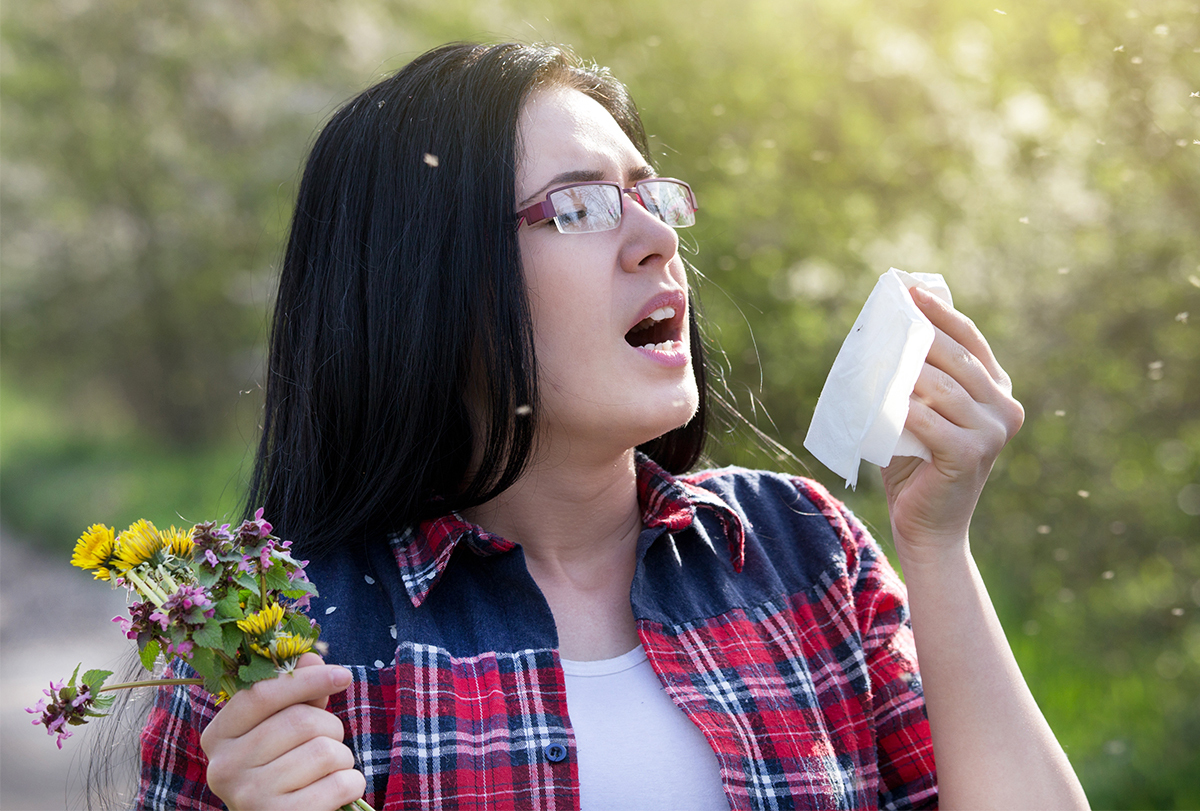In this article:
An allergy refers to an extensive immune response to foreign substances that are otherwise not harmful to the majority of individuals. When allergens are inhaled through the nose or mouth, they interact with the IgE antibodies present on the surface of mast cells.

These cells get activated and release chemicals, such as histamine that cause inflammation and itchiness in the mucous lining of the nose. This immune response is accompanied by increased mucus production and occurs as part of a chronic condition called allergic rhinitis or hay fever.
In 2018, approximately 19.2 million people, or 7.7% of the population, were diagnosed with hay fever in the United States alone. (1)
Types of Allergic Rhinitis
Allergic rhinitis occurs in two forms:
- Seasonal: Flare-ups are limited to spring, summer, and early fall and usually occur as a result of an allergy to pollen or airborne mold spores.
- Perennial: The symptoms are observed year-round and are usually caused by allergens, such as pet hair or dander, dust mites, mold, and cockroaches. Rarely, perennial allergic rhinitis may be due to hidden food allergies.
Occasionally, individuals may experience both perennial and seasonal rhinitis, wherein the symptoms are present throughout the year and aggravate during specific pollen seasons.
Nonallergic rhinitis, on the other hand, is caused by factors other than allergens, including irritants such as chemicals and smoke, hormonal changes, nasal deformity (such as a deviated septum), certain medications, and, at times, the overuse of nasal sprays.
Causes of Allergic Rhinitis

Allergic rhinitis is caused by exposure to various types of allergens, including:
1. Pollen
It is a fine powder produced by grasses, trees, and weeds and is a common allergen in the United States.
2. Dust mites
Approximately 40% of the global industrial population is allergic to various species of dust mites that inhabit both working and living environments. (2)
3. Cockroach waste
Around 40%–60% of people living in urban and inner-city areas are allergic to cockroach waste, making it one of the most common indoor allergens. (3)
4. Mold
It is a difficult allergen to avoid as this fungus can grow easily in any moist and dark area, such as the bathroom, the basement, a field with uncut grass, a pile of dead leaves, and a cabinet below a leaking sink.
5. Animal dander
The skin shed by animals is a frequent source of allergy, largely on account of pets. Approximately 65% of homes in the United States alone house a pet. (4)
During a bout of allergic rhinitis, the nasal lining becomes increasingly sensitive toward inhalants due to the swelling caused by hay fever. Therefore, the symptoms may be triggered by factors other than allergens, including:
- Smoke
- Strong odors, such as fragrances or cleaning products
- Temperature changes
- Altered humidity levels
Signs and Symptoms of Allergic Rhinitis
On exposure to allergens, the following symptoms may be observed immediately:
- Runny nose
- Itchy, watery eyes
- Sneezing
- Trouble smelling
- Itchiness in body parts such as the nose, throat, skin, or mouth
However, other symptoms may develop later, including:
- Nosebleeds
- Snoring
- Cough
- Nasal redness
- Phlegm
- Postnasal drip, causing throat irritation and clearing
- Recurrent sinus or ear infections
- Headache
- Sinus pressure
- Puffy eyes
- Fatigue and irritability
- Inflammation and pale-blue appearance of the nasal cavity
- Cobblestone throat, or the development of bumps at the back of the throat
- Nasal congestion, which may further lead to allergic shiners (dark circles under the eyes) and/or mouth breathing (impedes healthy facial development in children)
- Allergic salute, or the development of a crease along the nose, due to the constant rubbing of the nose with the palm to get rid of nasal itching
Clinical Treatment for Allergic Rhinitis
1. Medications
Medicines can help manage the symptoms of allergic rhinitis, but they do not treat the underlying condition and can trigger adverse side effects or other complications. Thus, use them as prescribed by the doctor.
The following drugs are commonly used for managing allergic rhinitis:
- Antihistamines: These medications provide immediate relief from an allergic reaction by curbing the release of histamine and are typically discontinued once the inflammatory symptoms subside.
- Intranasal corticosteroids (INCs): These nasal sprays provide anti-inflammatory effects and should be used regularly for proper results. Since different brands produce INCs of varying efficacies and dosages, it is recommended to consult your doctor or pharmacist and read the labels before using it.
- Combination drugs: These medications comprise both antihistamines and INCs that provide a synergistic effect.
- Decongestants: They aid relief from severe congestion. However, they are not suitable for all and their overuse may aggravate the symptoms.
Other medications that may be used include:
- Nasal mast cell stabilizers
- Leukotriene receptor antagonists
- Intranasal cromolyn
- Anticholinergics
2. Immunotherapy
Allergen immunotherapy helps in reducing symptoms in people for whom medications do not work or those who cannot avoid the allergens. It involves giving small doses of the allergen to a person within a span of time to help the body adjust to it and prevent future sensitization.
Diagnosing Allergic Rhinitis

Diagnosis of allergic rhinitis is made on the basis of:
- Medical history
- Symptoms
- Physical exam
However, if data are insufficient to determine the cause of your condition, the doctor may ask you to visit an allergy clinic for the following tests:
- Skin prick test, which involves applying minute amounts of potential allergens to your skin and observing the reaction they produce to find out which one is responsible for your condition
- Blood tests to check for the presence of IgE antibodies, which are released in the blood during an allergic response
The treatment will be suggested based on the type of allergen.
Risk Factors for Allergic Rhinitis
The following factors may predispose you to allergic rhinitis:
- Eczema
- Food allergies
- Asthma
- Passive cigarette smoking
- Family history of allergic rhinitis, asthma, or eczema
Complications Associated With Allergic Rhinitis
If the symptoms of allergic rhinitis are not managed, it may lead to the following complications:
- Nasal polyps, which are fleshy growths produced as a result of inflammation in the nasal lining or sinuses
- Middle ear infections
- Chronic rhinosinusitis, which refers to congestion and chronic inflammation of the sinuses
- Eustachian tube dysfunction due to a clogged ear
- Decreased sense of smell
When to See a Doctor
It is advised to seek medical help if the symptoms accompanying allergic rhinitis affect your day-to-day activities, sleep, and work performance. The diagnosis is generally made based on your symptoms.
It is important to identify your triggers and get an allergy test for the same if needed.
Final Word
Allergic rhinitis is an atopic condition that produces symptoms such as the runny nose, nasal congestion, sneezing, and nasal itchiness.
It affects the patient’s life quality and daily activities and is associated with significant morbidity, increased healthcare costs, and loss of productivity. Therefore, it is important to visit a healthcare facility for a proper diagnosis and appropriate treatment.

- Was this article helpful?
- YES, THANKS!NOT REALLY


